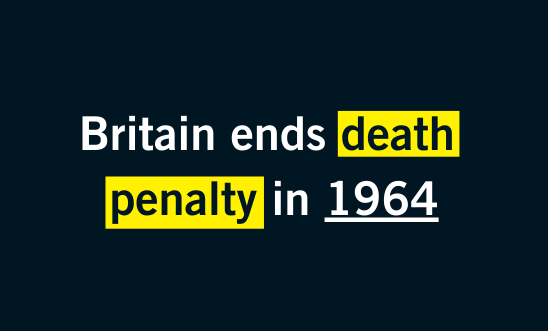
Progress Since The Last British Death Sentence 60 Years Ago

The Last Death Sentence in The UK
At 8am on 13 August 1964, two men, convicted just a few weeks earlier of murder, were led to the gallows at separate prisons in Manchester and Liverpool. No one involved knew it at the time, but Gwynne Evans and Peter Allen were the last executions before capital punishment was abolished in Britain.
Almost 60 years later, and support for the death penalty in the UK continues to fall. A recent YouGov poll has shown that less than half - 40% - of people still support the death penalty, down from 51% in 2010.
Read Our Latest Death Penalty Report
Changing Trends of Death Penalties
And it’s fallen dramatically around the rest of the world too. In Europe and Central Asia, the only country carrying out an execution was Belarus, carrying out one in total. Globally, carried out an execution Since 1991 the number of countries abolishing state-sponsored execution has more than doubled to 112 abolitionists for all crimes, while 9 were abolitionist for ordinary crimes only.
But despite its fall in use, at least 28,282 people remain under sentence of death at the end of 2022, while methods such as beheading, hanging, lethal injection and shooting are most commonly used. Our latest figure from 2022 represents the highest number of executions that Amnesty International has recorded in the past five years (since 2017, when 993 executions were recorded).
China remained the world’s leading executioner, but the true extent of the use of the death penalty in this country remains unknown as this data remains classified as a state secret. Similarly the two states of Viet Nam and North Korea's total figure of executions are unknown, but it is believed that the death penalty was resorted to in these countries extensively.
The death penalty should be come a relic of the past - and while the overall longterm trend is positive, we must continue to ensure that recent years will not define a new trend. This is why we should continue to campaign to keep the abolition trend going.
Death Penalty Facts and Figures Per Year
The following figure shows the yearly data on death penalty based on Amnesty International research, showing the total of number of executions, abolitionists for all crimes, ordinary crimes and in practice, as well as retentionsts. More information on this data and our latest report here.
"Country names listed reflect nomenclature in May 2023" and “This map indicates the general locations of boundaries and jurisdictions and should not be interpreted as Amnesty International’s view on disputed territories”.
Why The Death Penalty Must Be Abolished
The death penalty is not a deterrent
Our report in October 2013 showed no correlation between crimes rates in similar countries and an independent report by the US National Research Council found that US states with the death penalty have similar murder rates to states without.
‘The fruit of my experience has this bitter aftertaste: that I do not now believe that any of the hundreds of executions I carried out has in any way acted as a deterrent against future murder. Capital punishment, in my view, achieved nothing except revenge.’
Albert Pierrepoint, British executioner,1932–1956
It’s irreversible
Execution is the ultimate, irrevocable punishment, and the risk of executing an innocent person can never be eliminated.
Since 1976, 143 US death row prisoners have been completely exonerated for their crimes. They were found innocent for a wide range of reasons: new DNA evidence, falsified witness statements, or even misconduct by prosecutors.
In countries like Iraq and Iran, the death penalty often follows convictions relying on forced ‘confessions’ extracted through torture. We have reliable information that prisoners sent to Iraq’s death row were beaten with cables and subjected to electric shocks. Any country that deals in torture before deciding to execute has almost certainly executed the innocent.
It discriminates
You’re more likely to be executed if you’re a member of a minority group within a country that executes. The death penalty disproportionately affects racial, ethnic and religious minorities, and those living in poverty.
In the US, although half of all homicide victims are African-American, 77% of those executed since 1977 were found guilty of murdering white victims. And a 2007 study in Connecticut showed that African-American defendants were three times more likely to receive the death penalty than white defendants.
How Can You Help Stop the Death Penalty?
Amnesty International has been working on the abolition of the death penalty for decades and we have a strong network of supporters and members of our movement who continue to support this mission. We’re only as strong as our supporters, so join us and keep campaigning to stop the death penalty everywhere it’s used. You can:
JOIN THE ANTI DEATH PENALTY PROJECT
BECOME A MEMBER OF OUR MOVEMENT
Together, we can make the world one without the death penalty.